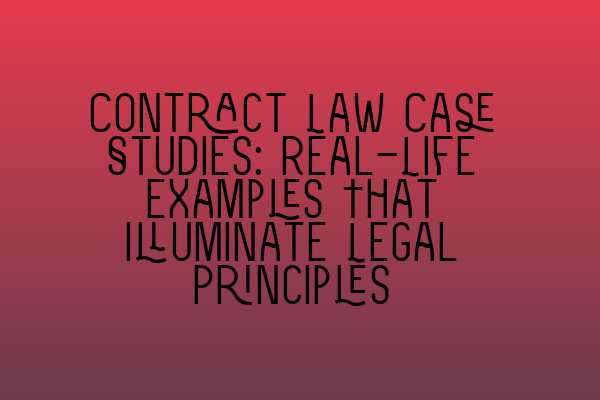Contract Law Case Studies: Real-Life Examples That Illuminate Legal Principles
In the world of contract law, theoretical knowledge can only take you so far. To truly understand and apply the legal principles at play, it’s crucial to delve into real-life examples. By examining actual contract law case studies, we can gain valuable insights into how different legal principles are applied in practice. In this blog post, we’ll explore some captivating contract law cases that shed light on various legal concepts.
Before we dive into the case studies, it’s important to understand the basics of contract law. A contract is a legally binding agreement between two or more parties that creates rights and obligations. To form a valid contract, certain essential elements must be present, such as offer and acceptance, consideration, intention to create legal relations, and capacity. Without these elements, a contract may be deemed void or unenforceable.
Now let’s explore some contract law case studies that highlight different legal principles and demonstrate the intricacies of contract law:
1. Carlill v Carbolic Smoke Ball Company (1893)
This landmark case revolves around a company that advertised a product called the “smoke ball,” claiming it could prevent influenza. The company promised to pay a substantial sum to anyone who contracted influenza after using the smoke ball as directed. A customer, Mrs. Carlill, used the smoke ball but still contracted influenza. She sued the company for the promised reward. The court held that the advertisement constituted a unilateral contract, and Mrs. Carlill was entitled to the reward.
This case illustrates the principle of offer and acceptance. The advertisement served as an offer, and by using the smoke ball, Mrs. Carlill accepted that offer, creating a binding contract.
2. Williams v Roffey Bros. & Nicholls (Contractors) Ltd (1991)
In this case, a subcontractor agreed to complete carpentry work for a contractor. The subcontractor encountered financial difficulties and was unable to complete the work on time. The contractor then promised to pay the subcontractor more money to ensure timely completion. When the subcontractor demanded the additional payment, the contractor refused, arguing that it was not enforceable under the original contract terms. The court held that the additional payment was valid consideration for the promise to complete the work, even though the subcontractor was already contractually obligated to do so.
This case demonstrates the concept of consideration, which requires each party to provide something of value in exchange for the other’s promises. The court’s decision expanded the traditional notion of consideration, recognizing the practical benefits gained by one party as valid consideration.
3. Esso Petroleum Co. Ltd v Commissioners of Customs and Excise (1976)
In this case, Esso Petroleum offered a promotion where customers could obtain free World Cup coins by sending in a certain number of purchased petrol vouchers. The issue arose when Customs and Excise claimed that VAT (Value Added Tax) should be paid on the coins distributed as part of the promotion. Esso Petroleum argued that the coins were gifts and not part of the consideration for the purchase of petrol. The court ruled in favor of Esso Petroleum, stating that the coins were not given as consideration for the sale of petrol but rather as a promotional gift.
This case emphasizes the importance of understanding the distinction between a gift and consideration. In contract law, consideration must involve something of value given in exchange for a promise, whereas a gift does not require such reciprocity.
By studying these contract law cases, we can see how legal principles have been applied in specific situations and better understand their nuances. These real-life examples bring contract law to life and provide practical insights beyond what can be learned purely from textbooks.
If you’re preparing for the SQE (Solicitors Qualifying Examination), understanding contract law and its application through case studies is essential. To further enhance your understanding of contract law and other examinable subjects, consider taking advantage of SQE preparation courses and practice exams provided by SQE Contract Law. These resources will help you consolidate your knowledge and improve your chances of success on the SQE exams.
To learn more about SQE 1 Practice Exam Questions, SQE 1 Practice Mocks FLK1 FLK2, SQE 2 Preparation Courses, SQE 1 Preparation Courses, and SRA SQE Exam Dates, click on the respective links. These articles provide valuable information and resources to support your SQE exam preparation journey.
In conclusion, contract law case studies serve as valuable tools for understanding legal principles and their practical application. By examining real-life examples, we can gain insights that go beyond theoretical concepts and prepare ourselves for the complexities of contract law in practice. So dive into these case studies, expand your knowledge, and arm yourself with the necessary skills to become a proficient contract law expert.
